|
|
|
Sort Order |
|
|
|
Items / Page
|
|
|
|
|
|
|
| Srl | Item |
| 1 |
ID:
149124
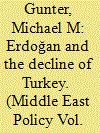

|
|
|
|
|
| Summary/Abstract |
Recep Tayyip Erdoğan — Turkey's current president (elected 2014) and former prime minister (2003–14) — in his first decade in power, won three parliamentary elections by ever-larger shares of the popular vote because he had helped to build Turkey into a burgeoning economic powerhouse and a moderate Islamic democracy. In the past half-decade, however, despite winning Turkey's first popular election for president in August 2014 and presiding over another great parliamentary victory in November 2015, Erdoğan's increasing authoritarianism has helped precipitate the disastrous decline of the nation as well as his own inevitable fall from power. What happened, and what lessons can be gleaned? Can Turkey's decline be reversed and its progress revived?
|
|
|
|
|
|
|
|
|
|
|
|
|
|
|
|
| 2 |
ID:
149121


|
|
|
|
|
| Summary/Abstract |
This paper was first discussed in an author workshop, organized by the Faculty of Economics and Political Science at Cairo University and the Center for Contemporary Middle East Studies at the University of Southern Denmark — in the framework of the DJUCO-initiative, funded by the Danish Arab Partnership Programme, Danish Ministry of Foreign Affairs.
|
|
|
|
|
|
|
|
|
|
|
|
|
|
|
|
| 3 |
ID:
149122
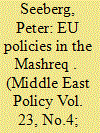

|
|
|
|
|
| Summary/Abstract |
The launching of the review of the European Neighborhood Policy (ENP) took place only a few days after the terror attacks in Paris on November 13, 2015. In her press release, the EU High Representative Federica Mogherini added that “the new ENP will take stabilization as its main political priority.”2 Furthermore, it was said that “differentiation and greater mutual ownership will be the hallmark of the new ENP.”3 This article discusses to what degree the EU's foreign and security policies towards the regimes in the Mashreq are capable of contributing to the stabilization of this highly differentiated Middle Eastern subregion. The article analyzes how important foreign- and security-policy dimensions emphasized in the ENP review are dealt with in the context of the Arab regimes in the Mashreq: Egypt, Jordan, Lebanon, Palestine and Syria.
|
|
|
|
|
|
|
|
|
|
|
|
|
|
|
|
| 4 |
ID:
149120
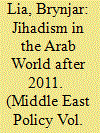

|
|
|
|
|
| Summary/Abstract |
One of the most puzzling developments since the watershed event of 9/11 and the onset of the U.S.-led Global War on Terror (GWOT) is the expansion of the jihadi movement in the Arab world. This has taken place despite serious efforts to prevent it from happening. Massive investments in counterterrorism and counterinsurgency by a U.S.-led international coalition, in cooperation with regional partners, have included the entire spectrum of instruments available in the state toolbox. This extensive and costly campaign notwithstanding, the past 15 years have witnessed a remarkable growth in jihadism as a rebel ideology, a military guerrilla force and a global terrorist menace.
|
|
|
|
|
|
|
|
|
|
|
|
|
|
|
|
| 5 |
ID:
149119


|
|
|
|
|
| Summary/Abstract |
The occupation of the Iraqi city of Mosul by the Islamic State (IS)1 has become an issue of global importance. The liberation of the city is seen as a symbol for defeating IS in Iraq, and there is international pressure to achieve this. Both the Obama administration and the prime minister of Iraq, Haider al-Abadi, have been pushing for the liberation of Mosul for political reasons.
|
|
|
|
|
|
|
|
|
|
|
|
|
|
|
|
| 6 |
ID:
149123
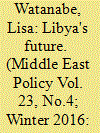

|
|
|
|
|
| Summary/Abstract |
The signing of the UN-brokered Libyan Political Agreement (LPA) in December 2015 and the subsequent establishment in March 2016 of a Government of National Accord (GNA), led by technocrat Fayez al-Sarraj, have raised hopes. Perhaps a two-year conflict that has divided the country between two rival parliaments and governments, each allied with armed actors, will finally be brought to an end and Libya's stalled transition resumed. Thus far, post-Qadhafi Libya has been plagued by the predominance of local interests linked to cities, regions and tribes that have thwarted the creation of a national polity. In principle, the LPA should mean that there is now agreement on new central-governance structures. However, this is far from being the case. The new unity government does not have broad-based support within the country and is increasingly vulnerable to challenges to its legitimacy. This does not bode well, given that the state lacks a monopoly on the use of force, with brigades and renegade units of the army operating autonomously.
|
|
|
|
|
|
|
|
|
|
|
|
|
|
|
|
| 7 |
ID:
149117
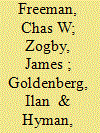

|
|
|
|
|
| Summary/Abstract |
The following is a transcript of the eighty-sixth in a series of Capitol Hill conferences convened by the Middle East Policy Council. The meeting was held at the Russell Senate Office Building in Washington, DC, on October 13, 2016, with Richard J. Schmierer, chairman of the board of directors of the Middle East Policy Council moderating, and Thomas R. Mattair, executive director of the Middle East Policy Council, serving as discussant.
|
|
|
|
|
|
|
|
|
|
|
|
|
|
|
|
| 8 |
ID:
149118
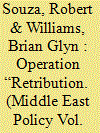

|
|
|
|
|
| Summary/Abstract |
September 30, 2016, marked the first anniversary of Russian President Vladimir Putin's decision to involve his nation militarily in the Syrian conflict on the side of Moscow's longtime ally, the Assad regime. According to initial Russian Defense Ministry statements and Putin himself, the mission had the primary objective of joining the U.S.-led coalition in fighting ISIS. Russia's chief of staff of the Presidential Executive Office at that time, Sergei Ivanov, using an alternative name for ISIS, laid out his country's official objectives on September 30, 2015: “The military goal of the operation is strictly to provide air support for the [Syrian] government forces in their fight against Islamic State.”1 The Mufti of Kazan (the head of Russia's Tatar community) and members of the Russian parliament lined up to support Putin's campaign in Syria, described as a “prophylactic against terrorist organizations” that was necessary to “destroy ISIS at its root.”
|
|
|
|
|
|
|
|
|
|
|
|
|
|
|
|
| 9 |
ID:
149125
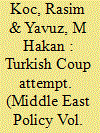

|
|
|
|
|
| Summary/Abstract |
When the Justice and Development Party (AKP) came to power in 2002, it encountered major resistance from state institutions, especially the secularist military, due to its Islamist roots and antisecular rhetoric. In an effort to counter the military and control state institutions, then-Prime Minister Recep Tayyip Erdoğan appointed followers of Fethullah Gülen to key government positions. This administrative support from the Gülen movement enabled the AKP to govern the country and closely monitor the military with the help of the police force. In order to consolidate his reputation as a moderately liberal Muslim leader, Erdoğan endorsed Turkey's joining the European Union, believing that membership in the EU would help grow the economy and build a democratic society.
|
|
|
|
|
|
|
|
|
|
|
|
|
|
|
|
| 10 |
ID:
149126
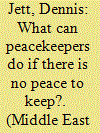

|
|
|
|
|
| Summary/Abstract |
They have a combined annual cost of $700 million, have been around for decades, are staffed by 14,000 soldiers and civilians and today do not seem to be accomplishing much of anything. What are they? The four peacekeeping operations (PKOs) in and around Israel. Put another way, why do all four of these operations continue to exist if there is currently so little peace to keep? There are a number of reasons for this paradox of peacekeeping, and an explanation requires taking a look at each of the four PKOs: the UN Truce Supervision Organization (UNTSO), the UN Disengagement Observer Force (UNDOF), the UN Interim Force in Lebanon (UNIFIL) and the Multilateral Force and Observers (MFO), which is not a UN operation.
|
|
|
|
|
|
|
|
|
|
|
|
|
|
|
|
|
|
|
|
|